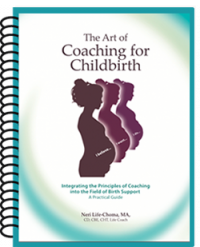
Advocacy Strategy that Promotes Patient-Centered Maternal Care
Patient engagement, patient-centered care, and partnerships among patients, their support group, and medical caregivers are the qualities leading to safety of care and patient satisfaction in general healthcare and maternal care. By learning to lead co-active and effective conversations in L&D, you can help the maternal care system achieve these goals.
Who’s ensuring these care qualities in Labor & Delivery?
You’re correct if you believe that it’s the role of the medical staff. Many scholarly articles and studies recognize these as long-sought and desired maternal care qualities. Yet, as birth support practitioners- childbirth educators, and doulas, we often don’t feel that the medical team manifests these care qualities during our clients’ birth experiences. For example, too often, the medical team acts as if informed consent is achieved by one-sided communication of informing their patients about their policies or standard practice instead of conducting a conversation in which patients ask questions, express their values, wants, and needs, and can expect the treatment plan to be decided in a co-active process that results in a shared-decision. And as patient advocates, we react to the situation strongly, becoming the “warrior” or ‘protectors’ of our clients. But is it serving birth givers? Does it increase our professional status? Does it serve our well-being? And how enthusiastic are you to enroll the next client, knowing you’ll engage in this communication again? And lastly, Do you want to learn how to improve the situation?
Do we act as birth givers’ advocates?
The emergence of childbirth educators and doulas as birth advocates coincided with the emergence of patient rights organizations in the 80s. Patient advocates are empowered to act in support of patients’ wishes as long as they do not get in the way of the ability to deliver medical care. So the question is: Are we getting in the way? Do birth advocates act within the scope of practice of patient advocates?
Birth Advocacy puts birth pros in conflict with the medical figures, often damaging our ability to act as birth givers’ advocates.
I suggest we recognize we are getting in the way to some degree. This is due to the many years of confusion between “Birth Advocates” and “Birth Givers’ Advocates.” Birth advocates act in support of the concept of natural, physiological birth and in favor of obstetric practices that support it. However, birth givers’ advocates work in accordance with their client’s wishes, values, wants, and mindsets and represent these in L&D.
As birth advocates, childbirth educators, and doulas have been practicing evidence-based advocacy, prioritizing and favoring evidence that supports the superiority of physiological, uninterrupted, and un-medicated birth for the past decade. Many of us informed our clients about what we perceived to be better maternal care practices, instilling doubt that their caregivers act in their best interest. Unfortunately, when doing so, we experienced conflict with the medical figures, and this conflict sometimes damaged our ability to act as birth givers’ advocates. When we practice birth givers’ advocacy, we don’t need to provide evidence in favor of better obstetric practice. The evidence we rely upon is provided by our clients, who hold firm convictions about their wishes and needs at the time of their birth. Those firm convictions are enabled and generated during a masterful prenatal coaching process. Can you see how advocating for your client’s values, needs, and convictions about what’s right for them during their birth differs from advocating for a better obstetric practice? And can you appreciate how this approach will resolve the conflict in L&D and makes us team leaders? Can you imagine yourself leading a co-active and productive conversation between your birth clients and their caregivers that helps the medical system improve and achieve higher care quality and safety?
How can we become patient-centered advocates and help improve maternal care
There are a few steps with which I think we can improve the situation. The first would be to feel and show compassion towards the medical practitioners who struggle to implement the three principles discussed. There are two main reasons for their struggle:
- First, they are primarily trained in clinical strategies.
- They are liable for the outcomes of the birth process and are highly exposed to litigation.
After supporting birth givers in L&D for 24 years, I am positive that the struggle is real, and they do care very much about their patients.
The second step is for you to learn how to lead co-active and effective conversations between medical caregivers and their patients in L&D to promote the implementation of the three principles of quality of care: Patient engagement, patient-centered care, and partnership. Co-Active means simply “being in action together” or “being together…in action.” When you master these conversational strategies you:
Co-Active means “being in action together” or “being together…in action”. We can practice co-active and productive advocacy.
- Navigate conflicts, design responses, and recover from being triggered
- Frame powerful questions that evoke the conversations needed to grow your leadership and the leadership of others
- Have conversations that deepen intimacy and collaboration between birth givers and caregivers
- Put relationships first
- Understand and trust your impact on others and the other agents
Can you see how a co-active conversation can help you practice patient-centered advocacy and lead the system toward providing patient-centered care? Leading co-active and effective exchanges rely on masterful coaching strategies that you prenatally practice with your birth clients and then continue to employ in L&D.
I’ll be leading a masterclass on the topic open to ALL birth professionals, including L&D team members. I invite you to register and join me on August 23rd for a 90-min experience learning to lead co-active and effective conversations in L&D.
>>>Click here to register for the Free 90-min masterclass, Patient-Centered Advocacy for Better Results in Maternal Care
- Matrescence: Identity-Shifting Transformation - March 12, 2024
- Empowering Black Birthgivers! - February 12, 2024
- Let’s Get Clients in 2024! - January 23, 2024


